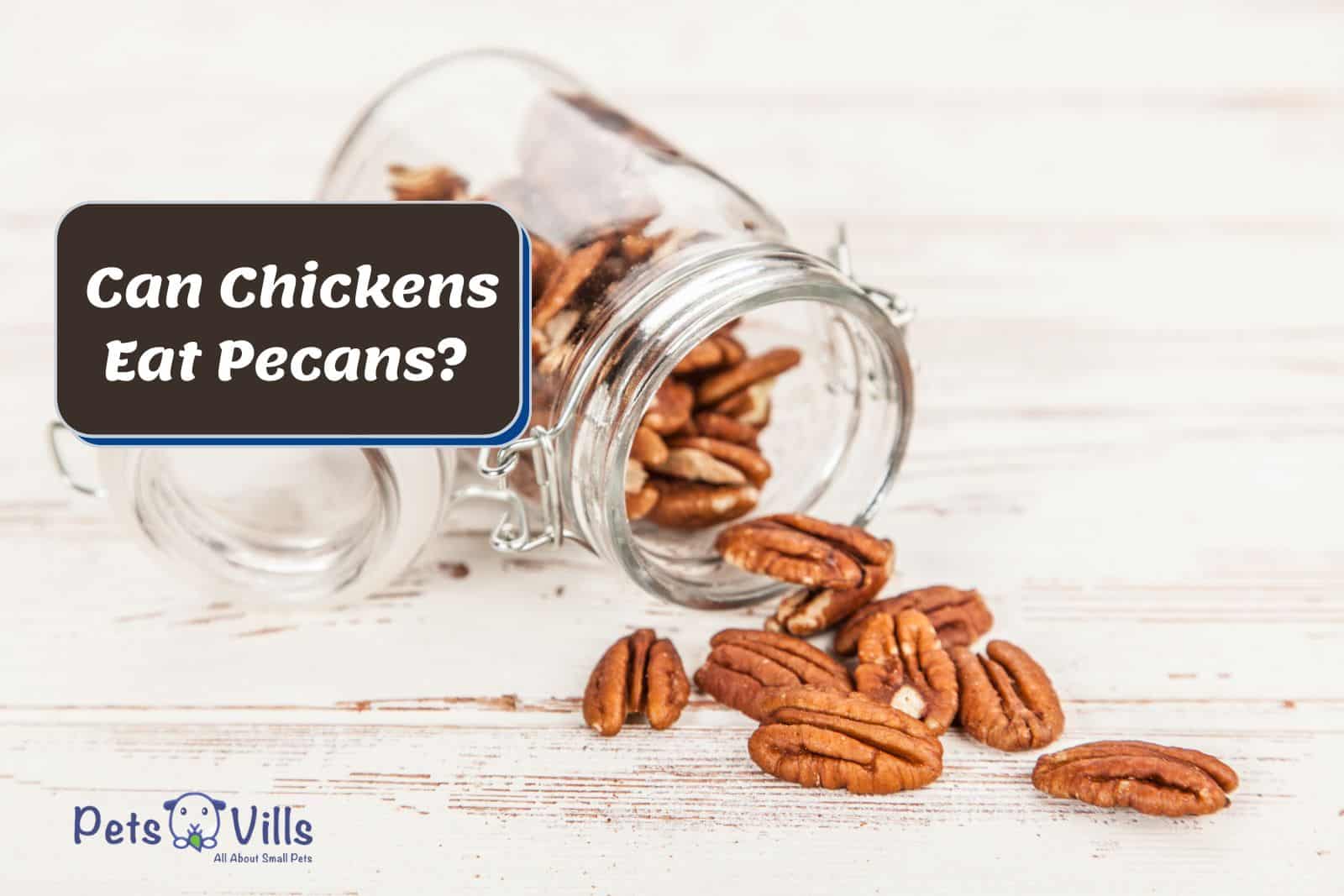Coveting your burning question, “Can chickens eat pecans?” Luckily, my dearest cousin, a chicken expert, recently told me the following:
“Yes,” she said, “chickens can eat pecans.”
A tasty treat with a sweet flavor, these nuts pack healthy fats and protein, fiber, vitamins, and minerals ― sparkling for your chickens.
Don’t hesitate to know more! I’m willing to share with you my best tips… (Keep scrolling!)
Table of Contents
Key Takeaways:
- Pecans offer a wonderful treat for your chickens, rich in various nutrients.
- Pecans are high in sugar, so feed this treat only in moderation!
- Pecan leaves contain juglone, a poison to your chickens. So be careful with this part!
Is It Healthy For Chickens To Eat Pecans?
During the fall and early winter, if you have a pecan tree growing in the backyard, look at the ground: Nuts are everywhere, scattered across your beautiful yard.
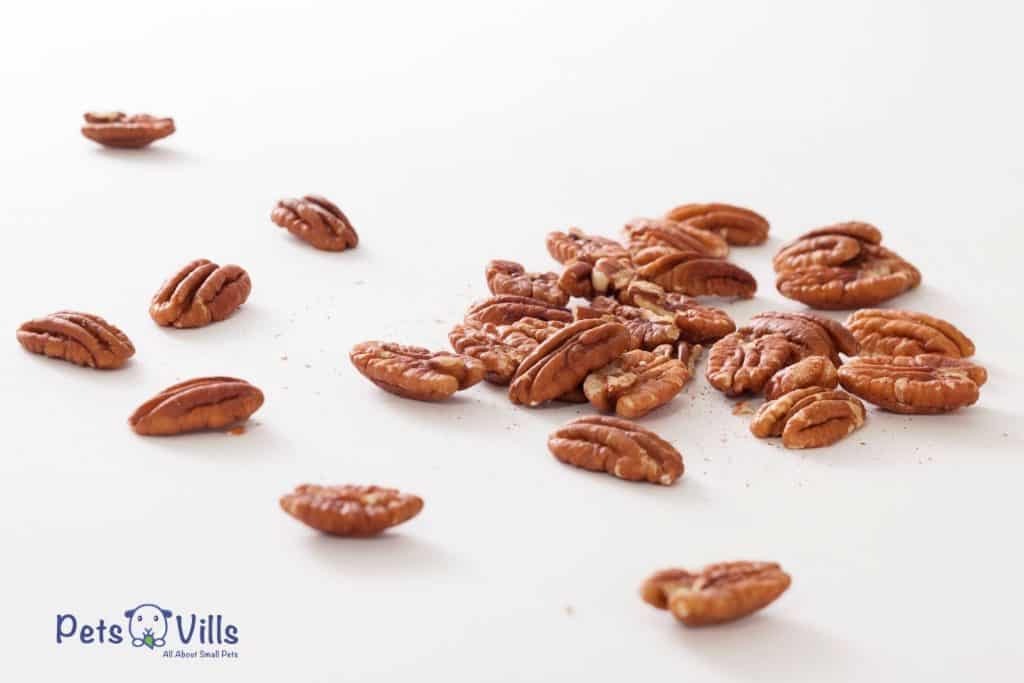
If you raise backyard chickens and let them roam freely in the yard, you may wonder if chickens can eat pecans…
According to Healthline’s registered dietician and writer, Rachael Link, MS, RD: pecans “are a good source of fiber, along with copper, thiamine, and zinc. [1]“
There you have it: Pecans are an excellent source of nutrition: a source of vitamins, minerals, and other nutrients. For that reason, pecans are healthy for chickens to eat.
But balance is key ― you’ll want to feed them this sweet and delicious treat occasionally. It’s high in fat content, so too much is a hazard for chickens and will also be so for your chickens!
For reference, one ounce (28 grams) of pecans contains the following nutrients:
- Calories: 196
- Protein: 2.5 grams
- Fat: 20.5 grams
- Carbs: 4 grams
- Fiber: 2.7 grams
- Copper: 38% of the Daily Value (DV)
- Thiamine (vitamin B1): 16% of the DV
- Zinc: 12% of the DV
- Magnesium: 8% of the DV
- Phosphorus: 6% of the DV
- Iron: 4% of the DV
The above data is from the USDA [2].
Further, below are some of the health benefits the chicken can get from eating pecans:
1. Pecans Help Promote Healthy Digestion
Pecans are high in dietary fiber and are essential for a healthy digestive system.
Fiber helps promotes regular bowel movement and prevent constipation, helping food travel through your chicken’s digestive system smoothly.
2. Pecans Are High in Fat
Pecans are especially high in fat content. Fats are bad for your chicken, but only when you feed it too much of these nutrients.
On the contrary, foods high in fats are sometimes good for chickens.
During the winter months, chickens are always outdoors in the extreme cold. Thankfully, eating food high in fats will make them cozier and better suited for the winter!
3. Pecans Have Antioxidants
Pecans are a good source of antioxidants and are essential for the well-being of chickens. It helps protect the cells in the body from damage created by free radicals.
These molecules can come from the normal metabolism in the body, foods that the chicken eats, and even cigarette smoke.
Are you a visual learner? Then don’t miss this excellent video about the attractive benefits of these nuts:
Can Chickens Eat Pecan Leaves?
Pecan leaves contain a toxin called juglone. This toxin acts like cyanide, and when ingested by the chickens, it can be very poisonous to them [3].
Still, due to the low concentration of toxins, it’s not enough to kill the chickens.
In small amounts, juglone may cause digestive problems such as diarrhea and upset stomach. But in large amounts, it can be fatal for the chickens.
The chickens often forage the leaves if you have a pecan tree in the backyard. Don’t worry if you see them scratching!
On the other hand, if the chickens are pecking at it, it’s best to remove your chickens from the area.
Discover the amazing benefits of feeding your chickens walnuts in our latest article ‘Are Walnuts Good for Chickens‘ and give your flock the nutrition they deserve!
Can Baby Chickens Eat Pecans?
Baby chickens can eat pecans. But wait until they are 2 weeks old to ensure their digestive system is ready for new food.
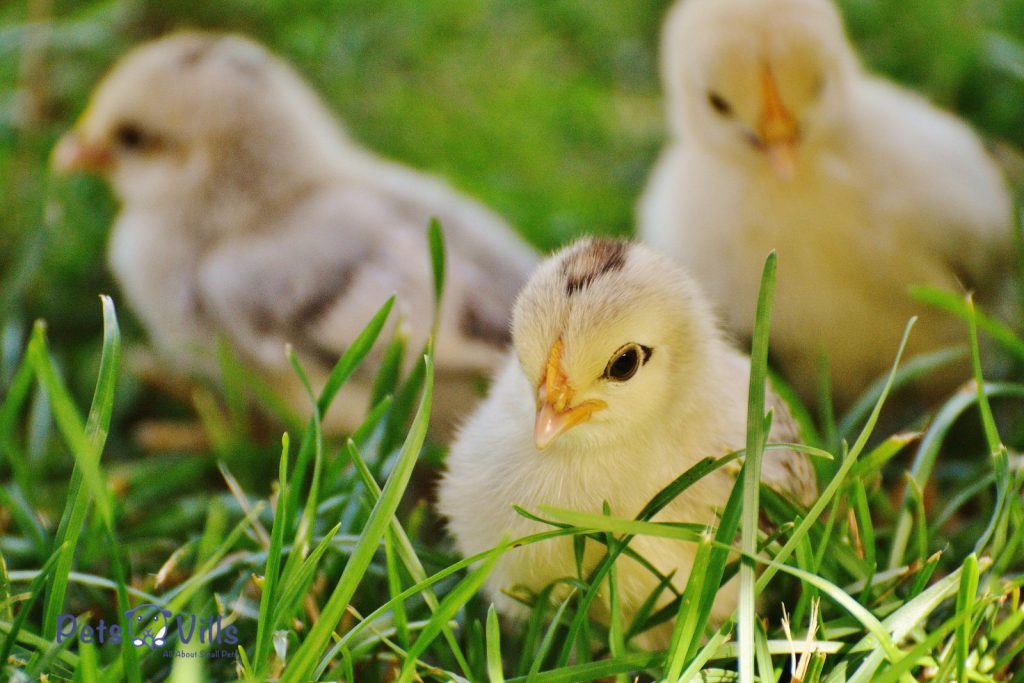
When feeding pecans to chicks, be careful with too much!
At this age, you’ll want to feed them chick starter feeds.
Manufacturers formulated this starter feeds to provide everything the baby chicks need ― a proper meal.
You can feed these pecans as a nutritional boost by sprinkling them as supplement foods to their primary diet.
Along with the feed and pecans, provide them with shell grit. Like all birds, and unlike humans, chickens do not have teeth to help them grind food.
Instead, they require grit which helps to aid the digestion process. These grits will help grind the food.
You’ll need to provide shell grit specially ground for baby chicks. To find these goodies, check online or at your local pet shop.
Be sure to visit “Can Chickens Eat Almond Flour?” and “Can Chickens Eat Carrots?” for a deeper peck into the intriguing dietary choices of chickens.
How To Feed Pecans To Chickens
Pecans are tough, so your chickens will struggle to eat them whole. To simplify this daunting process, break these nuts into bits and pieces.
Beware of choking: By munching on this nut whole, your chickens can choke, so beware…
If you’re concerned about how to feed pecans to chickens, don’t despair ― I got you covered with these 2 methods:
Method 1: Cutting Into Pieces
To perform this method,
Break the nut into smaller pieces. Then, toss them to the chickens. The result? Your chickens will munch on the aftermath!
These bits are more accessible to digest than larger chunks. And your chickens will thank you for it!
Method 2: Mixing It Into Feeds
To do this method,
Mix this yummy nut in with their feeds. Next, grab this delicious nutty mix. Then, mix it into their feeding bowl and feed them to your chickens. So easy!
And guess what: MORE nutrition for your chickens…
How Many Pecans To Feed Chickens
Feed pecans to the chickens in moderation.
Here’s why…
These nuts do not have enough nutrition to meet the chicken’s dietary needs. Feeding them just the pecans or too much of it could severely affect their health.
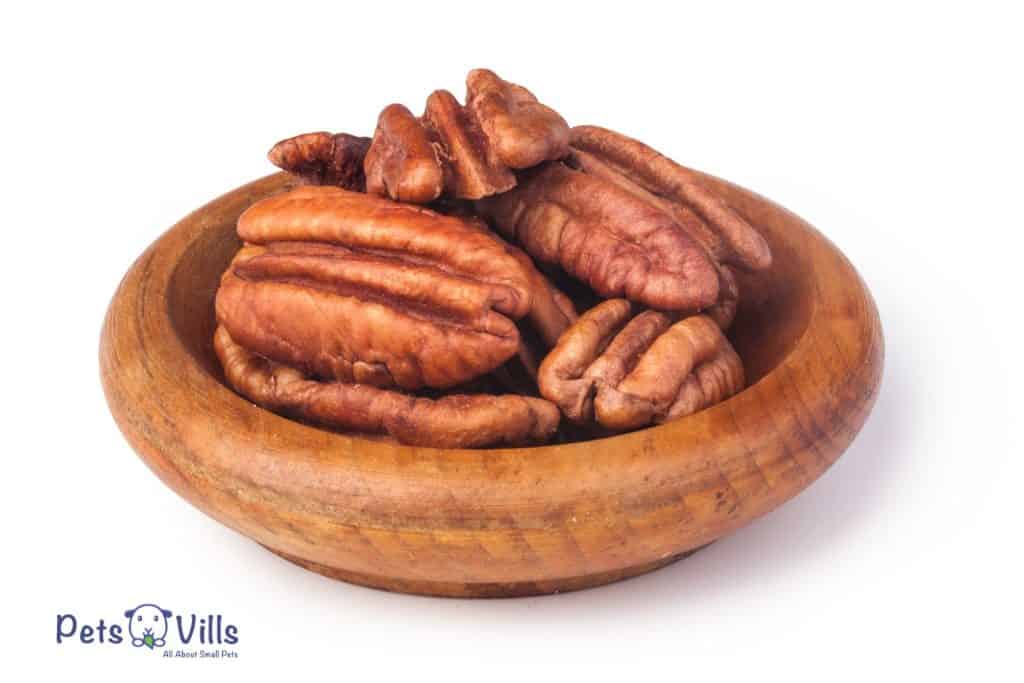
Your dears should eat pecans as treats only. These nuts should make up only 10% of the chicken’s main diet. Quality commercial feeds are responsible for the rest ― the other 90%.
Perfect for your chickens, these feeds are formulated with the correct nutrition to meet the chicken’s dietary requirements.
So, don’t meddle too much with the dietary requirements. Instead, feed pecans to the chickens once or twice per week and no more.
Such a routine should be enough for your chickens, a once-in-a-while treat, without having you worry about causing any severe health issues to your darlings.
Don’t forget that ROTATION is the magic word: rotate pecans with other tasty foods throughout the week. The result? Your dears will get plenty of nutrition that pecans don’t offer alone.
What’s more, these options will fuel your chickens with great energy and zeal…
FAQs
1. Can chickens eat pecan pies?
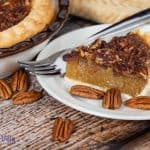
Yes.
Chickens can eat pecan pies but because of the high sugar content, feed this treat only in moderation.
2. Can chickens eat pecan shells?
Sure!
What is so fantastic about chickens is their digestive system, a gizzard, breaking down these stiff meals.
But it would be best if you were careful: don’t feed shells too big for your chickens’ beaks.
Conclusion
So, can chickens eat pecans? Yes!
Though a caveat: fresh pecans, an excellent treat for chickens, are high in sugar content. So monitor your dears and ensure they get adequate nutrients from their chicken feeds.
For a balanced diet, focus on nutritious foods, nutritious treats, and chicken feeds. To your touch of creativity, you can sprinkle pecans as an occasional treat ― but not too much!
As always, heed caution at the end of the day. Focus on your gut, and more importantly, should you be concerned, consult your Vet.
Lastly, if you have any super duper tips you’re keen to share, don’t hesitate. Comment below!
Until next time…
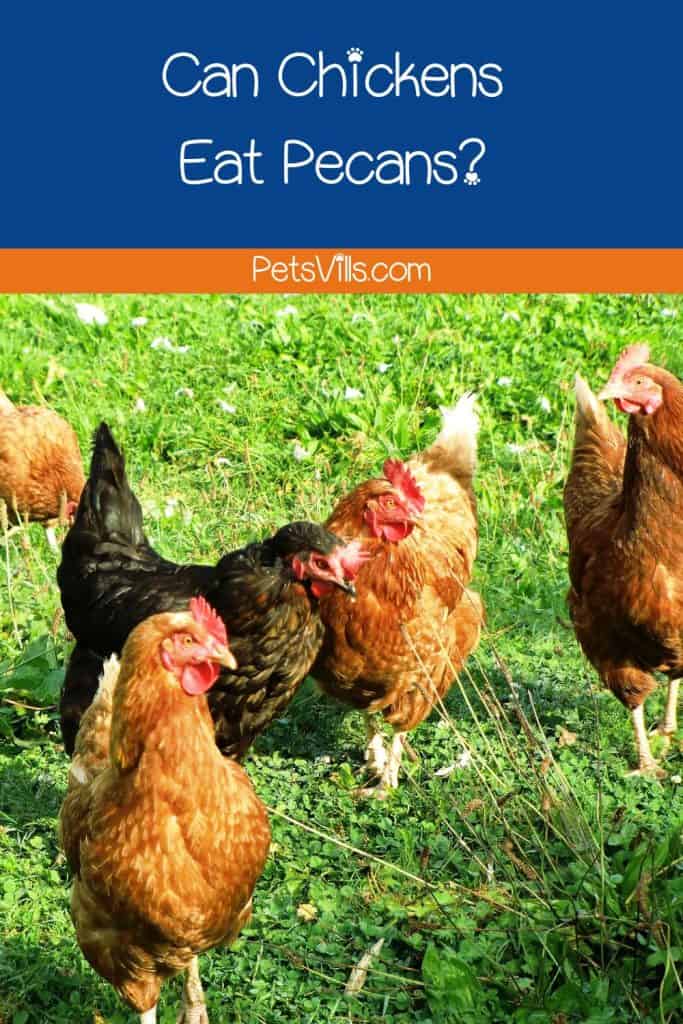
Resources
1. Link R. Are Pecans Good for You? [Internet]. Healthline. 2020. Available from: https://www.healthline.com/nutrition/are-pecans-good-for-you
2. FoodData Central [Internet]. fdc.nal.usda.gov. Available from: https://fdc.nal.usda.gov/fdc-app.html#/food-details/170182/nutrients
3. Daugherty W, Smith S, Wigal C, Verhoek S. Distribution of 5-Hydroxy-1,4-Naphthoquinone and Other Napthoquinone Derivatives in the Juglandaceae (Walnut Family) and Related Families [Internet]. Researchgate. 1995. Available from: https://www.researchgate.net/publication/264604799_Distribution_of_5-Hydroxy-14-Naphthoquinone_and_Other_Napthoquinone_Derivatives_in_the_Juglandaceae_Walnut_Family_and_Related_Families
Grigorina grew up surrounded by animals – dogs, cats, cows, goats, sheep, and horses and that has shaped her into what I am today – a crazy cat lady who always has a place for one more cat (or a dog). She has two female cats – Kitty and Roni, and two tomcats – Blacky and Shaggy, but she also feeds her neighbors’ cats when they come for a visit. I just can’t say no to them. Follow her on FACEBOOK AND INSTAGRAM
Read her latest articles HERE
Learn more about her

